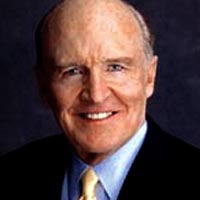
Jack Welch
Past CEO of General
Electric |
 BACK BACK |
|
  SPEAKER ORATEUR:
JACK WELCH SPEAKER ORATEUR:
JACK WELCH
When Jack Welch took over management of GE in 1981, it had profits of 1.5 billion dollars on sales of 27 billion dollars, making it the ninth most profitable company in the U.S.
Over the course of the next decade, he made it the nation's most profitable company. By 2000, GE earned 13 billion dollars in profit on 130 billion dollars in sales.
At the same time, Wall Street valued GE higher than any other company in the world. When Welch took the helm, GE was worth "only" 14 billion dollars. But in the 1990s its stock market valuation rose to a peak of near 500 billion dollars.
In other words, while profits increased about tenfold, market value increased some thirty-fold.
With a Ph.D. in chemical engineering, Welch began his career at GE moving a new thermoplastic out of the lab and into production. In 1968, he became general manager of GE's 26-million-dollar plastics business. Revenues doubled in less than three years.
A series of promotions quickly followed until he soon became sector executive for consumer products and services, a business with more than 4 billion dollars in revenues, and which put him in the uppermost echelon at GE. Following a grueling competition, on December 15, 1980 he was told by his predecessor, Reg Jones, that he would be the next GE CEO.
As CEO, Welch began a controversial program to position GE as the number one or number two player in each of its many businesses, thus neatly anticipating the restructuring of American manufacturing that would result from Japan's growing presence in world markets. GE was, in Welch's words, "the first big healthy and profitable company in the mainstream that took the actions to get more competitive."
Within five years of his becoming CEO, one of every four employees would leave the GE payroll-118,000 in all, with 37,000 as a result of businesses that were sold.
Welch sold GE's air conditioning, housewares, TV manufacturing, semiconductor, aerospace and satellite businesses, as well as Utah International, a coal mining and oil company.
His biggest coup, however, was the acquisition of RCA, the largest non-oil merger of its time. By keeping television network NBC and the RCA businesses that meshed well with GE, while selling others, the acquisition, Welch says, resulted in GE having "a great network and station lineup with strong cable assets, a truly global medical business, a significant position in a global satellite company, and tens of billions of dollars in cash-all for an initial investment of 6.3 billion dollars in 1985."
As this strategy unfolded, Welch went to work improving GE's operations through an intense focus on people-identifying motivated managers, and developing programs that measured success and spread it throughout the company, not to mention rewarding performance through stock ownership and option grants.
There have been stumbles along the way as well. In 1986 GE bought the Wall Street investment firm Kidder Peabody and walked into one of the decade's largest financial scandals, followed in 1994 by the revelation that a Kidder Peabody trader, Joseph Jett, had used weaknesses in the company's computer systems to make phantom trades that cost more than $350 million to unwind. Realizing, he said, that Wall Street's culture would never mesh with GE's, Welch sold Kidder in 1994.
A final disappointment was the breakdown of GE's proposed merger with Honeywell, due to opposition by the European Commission, even as Jeff Immelt, the new GE CEO, was coming on line.
In the 1990s Welch's management of GE's operations could be defined by four key initiatives: globalization, services, Six Sigma, and e-Business.
| European Speakers Bureau |
phone +32 (0)2 646 13 83 |
fax +32 (0)2 646 41 73
Rue Americaine 221, 1050 Brussels Belgium |
|







